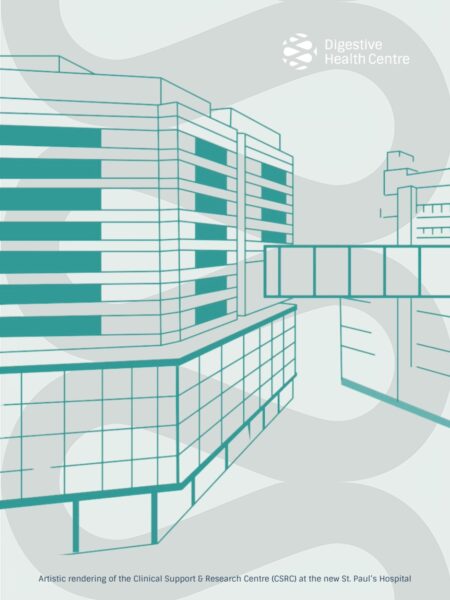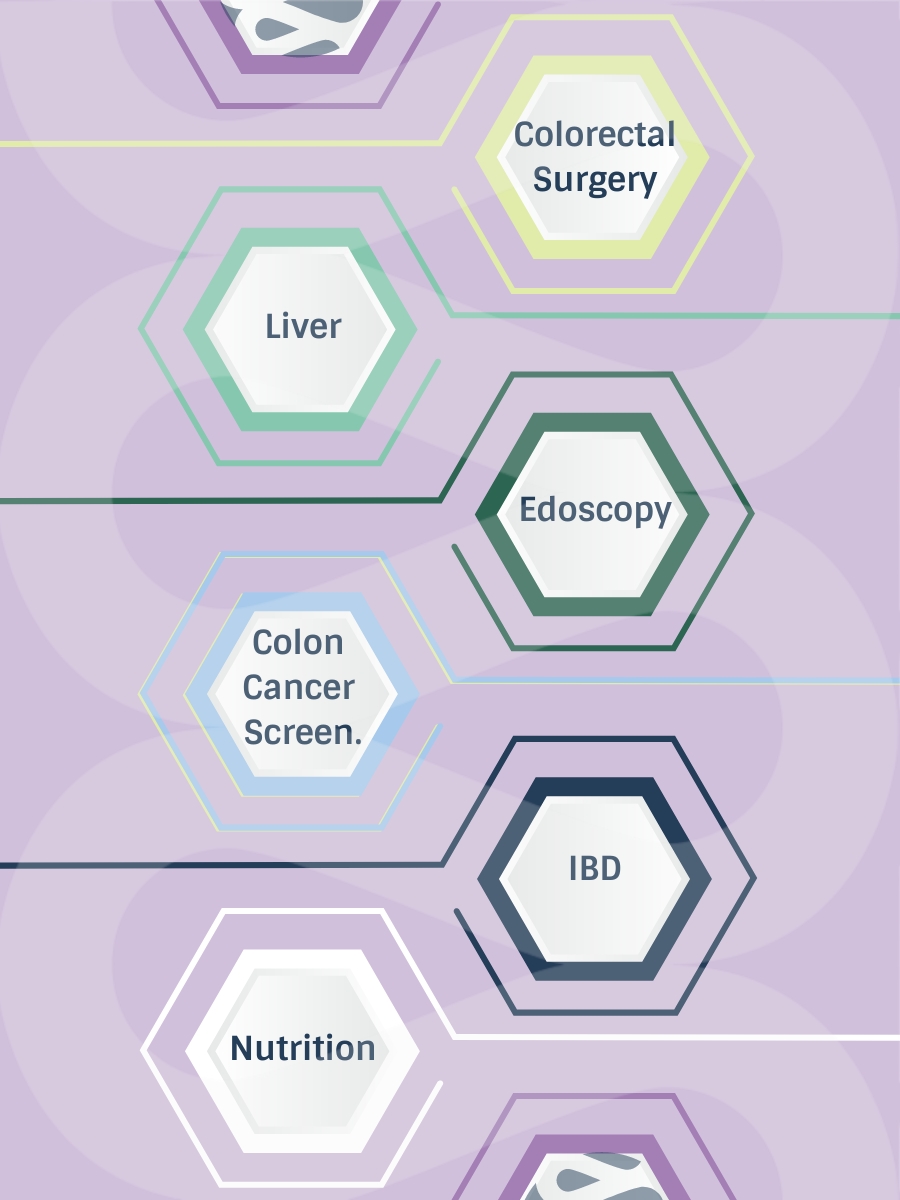About the Digestive Health Centre
The Digestive Health Centre’s unique model offers unparalleled advantages. It ensures a higher level of specialized care, better patient outcomes, and a more integrated treatment experience. This innovative approach is not just a departure from traditional models but a significant advancement in the field of digestive health.
Headline and text module
The DHC epitomizes the transformation of care that is the central tenet of the new St. Paul’s Hospital.
By harnessing the expertise and enthusiasm of BC’s most accomplished gastroenterologists and colorectal surgeons, and bringing care providers under one roof, we will be able to provide efficient and compassionate care based on the individual and unique needs of patients.
With all specialists and allied health personnel in a single space, evaluation and therapy that would often require a patient to attend as many as five to 10 visits could be accomplished in as few as one or two.
Whether a patient is from Greater Vancouver or throughout BC, they will find comfort in knowing they’re on a health and treatment journey unlike any they’d find elsewhere in the world.

At the DHC, patients will have access to an array of expertise through its six pillars of care: therapeutic endoscopy, colon cancer screening, colorectal surgery, inflammatory bowel disease (IBD) care and management, liver disease and nutrition.
1/4

The DHC will be equipped to train future clinical and academic leaders and assist them to expand their expertise in patient care with state-of-the-art research facilities, access to telehealth, ECHO (cardiovascular health) programs, clinical and research networks, wet labs and biobanks.
2/4

Located next to the new St. Paul’s Hospital, the CSRC will enable DHC clinicians and researchers to build on existing collaborations between the province’s gastroenterologists and colorectal surgeons, allied health professionals, health authority administration, BC Cancer Agency oncologists, and Indigenous healthcare researchers and leaders.
3/4

Our teams will partner with the entire health sector, including industry partners, academia, health authorities, patient advocacy groups, and others in the scientific and clinical communities to deliver the best possible patient care.
4/4
300k
Canadians who die from diseases related to digestive health disorder annually
24.3k
Canadians diagnosed with colorectal cancer every year
230k
Canadians suffering from inflammatory bowel disease
4,500
Cases of ulcerative colitis diagnosed each year
5,700
Cases on Crohn’s disease diagnosed each year
Image W. Cards Module
The DHC will be a teaching and training powerhouse.
The training of medical students, residents and fellows in colorectal surgery, IBD and therapeutic endoscopy will make the Digestive Health Centre the only one of its kind in the world.

A groundbreaking collaborative hub of research, training and clinical care, the centre is organized into six pillars for patients dealing with digestive and gastrointestinal disorders.
The St. Paul’s Hospital Advanced Endoscopic Resection Centre (SPARC)
SPARC will utilize minimally invasive and organ-sparing endoscopic resection techniques for safely treating pre-cancerous and early-stage cancers of the esophagus, stomach, and colorectum.
Lunken Lab Biobank
The biobank is designed to support translational and clinical research focused on inflammatory bowel disease (IBD). It enables the investigation of microbiome-related aspects of IBD, including disease progression, treatment response, and biomarker discovery. To enable investigation of these aspects, the biobank will collect and store de-identified fecal, mucosal, and tissue samples from IBD patients during different phases of their disease as well as non-IBD controls.

Our Services
The DHC offers a wide range of services organized into six pillars:
- Colorectal Surgery: Provincial centre of excellence for surgical treatment of colorectal disorders.
- Liver Disease: Management and treatment of various liver diseases.
- Therapeutic Endoscopy: Early diagnosis and treatment of GI cancers.
- Colon Cancer Screening: Detecting cancer at an early, treatable stage.
- Inflammatory Bowel Disease: Comprehensive care for patients with IBD.
- Nutrition: Access to specialized nutrition support programs.
FREQUENTLY ASKED QUESTIONS
How will the DHC improve patient care compared to the current model?
The DHC will unify various specialized services under one roof, fostering collaboration among multidisciplinary teams of gastroenterologists, colorectal surgeons, hepatologists, nutritionists, and other specialists. This integrated approach ensures seamless patient care, from diagnosis to treatment, and leverages the latest research and technological advancements to improve patient outcomes.
Equipped with multiple endoscopy suites and enabled for surgical procedures, this will be the most equipped Centre in Canada for Digestive Care.
When will the new DHC facility open, and where will it be located?
The new DHC facility is expected to open its doors in 2028 at the Clinical Support and Research Centre on the Jim Pattison Medical Campus. Until then, the DHC operates from three locations: St. Paul’s Hospital, The IBD Centre of BC, and Pacific Gastroenterology Associates. (PGA)
How can patients get involved or access services at the DHC?
Patients can access services at the DHC by contacting our dedicated team for referrals and appointments.
Additionally, patients can get involved by participating in clinical trials, providing feedback on their care experiences, and supporting the DHC through donations and advocacy.
How can my organization collaborate with the DHC?
Health authorities and industry partners are encouraged to collaborate with the DHC through funding, clinical trials, research partnerships, and educational initiatives.
The DHC is committed to advancing the field of digestive health and welcomes collaborations that aim to improve patient care and develop innovative treatments for digestive and gastrointestinal disorders.

